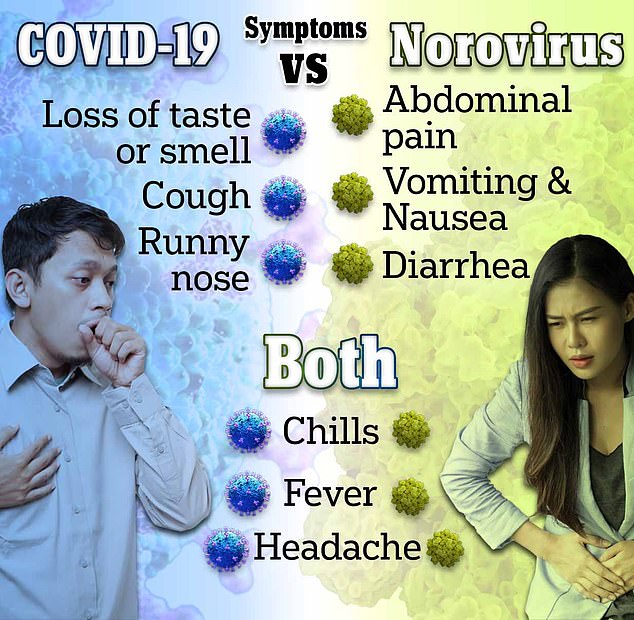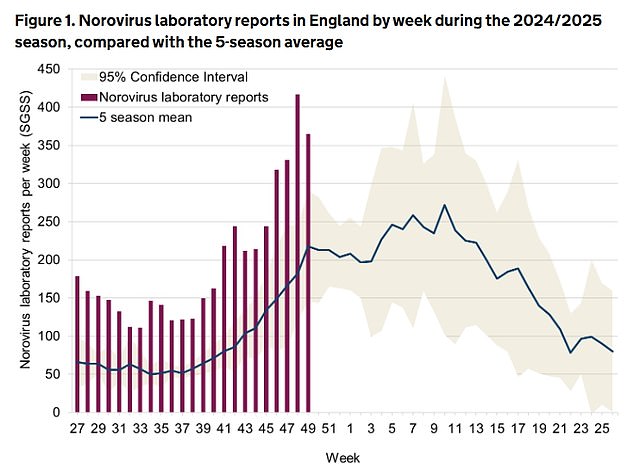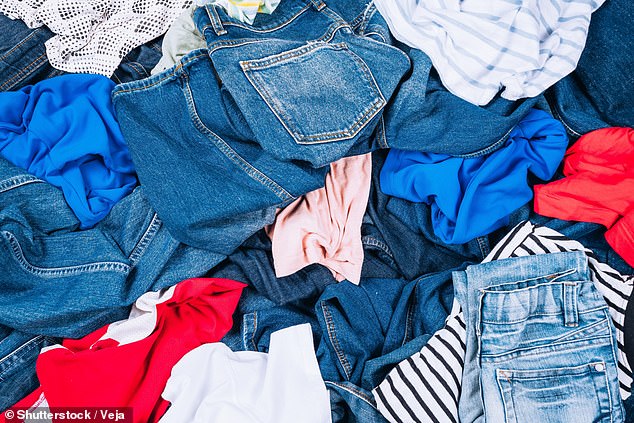Norovirus microbes can lurk silently on the fabric of clothing for up to a month, infecting those who touch them, experts warned today amid a worrying rise in infections.
Other fabric-covered objects, such as chairs, sofas, cushions and even curtains, could also harbor the highly contagious virus.
According to figures, cases of winter vomiting, which can also cause diarrhea, have increased by 40 percent compared to previous years.
Experts fear any further rise could put additional pressure on an already overstretched health service already battling a wave of flu.
Norovirus is usually spread through close contact with someone infected, by touching surfaces or objects, or by eating food that someone infected has touched.
Health chiefs already advise against relying solely on hand sanitisers to protect against transmission, as alcohol does not kill the virus.
Instead, handwashing is recommended as a first-line defense, as water helps break down the protein layer surrounding the virus, making it harmless.
Now, experts are urging people to wash and dry their clothes on high heat in an effort to stop the spread.
Experts have urged people to wash and dry their clothes on high heat in an effort to stop the spread of norovirus.

Norovirus may appear similar to Covid symptoms, with both viruses causing chills, fever and headaches.
Jason Tetro, microbiologist and author, told HuffPost: ‘Your clothes are porous and therefore essentially a solid Petri dish.
‘Anything that comes into contact with your clothes will stick to it. “Norovirus (can) survive an entire month in virtually any condition.”
Laundry detergents, he added, specifically the biological type, those that contain enzymes called lipases, will help kill norovirus bacteria.
“Heat is your best friend against microbes,” said Mr. Tetro. “The enzymes are going to break down the microbes.”
He also recommended running an empty hot water cycle with bleach about once a month to clean the washing machine tub.
Experts at the University of Minnesota warn that cleaning surfaces touched by someone with norovirus is “a critical way to remove and destroy the virus.”
If a person has vomited on the furniture carpet, they are warned not to vacuum the area before cleaning it “as this will cause the pathogens to become airborne and spread.”
Instead, she suggests applying baking soda to the affected area before steam cleaning or disinfecting with antimicrobial products effective against norovirus.

Rates of vomiting, which can also cause diarrhoea, are also more than double the levels seen pre-Covid for this time of year, UKHSA figures show.
The latest UK Health Security Agency (UKHSA) published last month also shows that the total number of norovirus reports this year (4,523) is more than double that of five years ago (2,057).
The alert comes as norovirus cases in the UK are almost double what they were in previous years.
According to NHS data published today, 528 hospital beds in England were occupied each day last week by patients with diarrhea and vomiting or norovirus-like symptoms.
While this was down from 723 the previous week, the figure is still 40 percent higher than the same point last year (377) and in 2022 (338).
However, the actual number of cases nationwide may be even higher.
This is because the figures are based on positive laboratory reports and NHS hospitals reporting suspected and confirmed norovirus outbreaks.
Most of those infected suffer nausea, diarrhea and vomiting and recover at home.
But norovirus can increase pressure on hospitals because infected patients must be isolated in individual rooms or wards must be closed to new patients to contain the spread.
“It came out of nowhere,” says the former IT consultant from Reading. ‘I couldn’t get more than a few meters away from the bathroom before I had to run back.
In response to a Mail on Sunday column written by Dr Ellie Cannon in November, readers wrote detailing how it had affected them.
A 69-year-old woman described experiencing “the most aggressive diarrhea and nausea” after caring for her granddaughter. Another spoke of her 29-year-old son being “completely crushed” by the virus.
Paul Pardon, 73, says he contracted the “excruciating” virus after returning from a holiday.
‘This went on for days. During that time I couldn’t eat it all. He also had a terrible fever and was shaking constantly.’
Most people will not need to talk to a doctor about a norovirus infection.
In most cases, it will go away on its own.
Health bosses often recommend rest and drinking plenty of fluids to aid recovery. Paracetamol can also relieve fever or aches and pains.
Rehydration drinks, such as Dioralyte, which replace essential salts and water, can be purchased from the pharmacist.
Parents are advised to avoid giving soft drinks or fruit juices to children with norovirus, as this can make diarrhea worse.
Many patients also ask their doctor for antibiotics, but these are not effective against viruses.
However, patients with particularly severe vomiting and diarrhea may be given anti-nausea medication from a GP.


